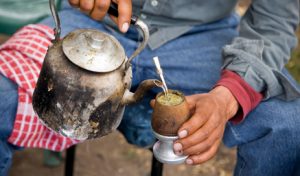 Let them drink tea! Brits love a cuppa but one of our scientists has found a link between tea and cancer.
Let them drink tea! Brits love a cuppa but one of our scientists has found a link between tea and cancer.
It’s a bit of a cliché, but Brits love a cuppa. So you can imagine our concern when research funded by World Cancer Research Fund seemed to suggest that drinking tea increased the risk of oesophageal cancer.
Fear not! Our scientists looked at the research and confirmed that it is only very hot tea, hotter than 60°C, that can increase your risk of cancer. Adding a splash of cold milk to your tea should be enough to lower the temperature and your risk of cancer.
So, if the UK aren’t drinking their tea so hot, who is? Well, in Iran and parts of east Africa, tea is prepared and drunk differently. Often hotter than 75°C!
It is this, along with other local cultures and practices such as smoking opium, a lack of fruit and veg in the diet, and fear of diagnosis that has combined to increase rates of oesophageal cancer in these regions.
> You can find out more about this research on our international website.
This is a great example of how one food or nutrient doesn’t have a large impact on causing or protecting you from cancer. Instead, your overall lifestyle – what you eat and how active you are – combine across your life to make you more or less susceptible to different cancers.
Drinking very hot tea can increase the risk, but the biggest risk comes from a combination of drinking very hot tea, smoking opium, having a poor diet, and being overweight or obese.
At World Cancer Research Fund, we cut through the jargon and give the public the latest evidence-based research in practical, straightforward ways to help them reduce their risk of developing cancer. So pop the kettle on! Just be sure you don’t add any sugar.
One of our Cancer Prevention Recommendations is to avoid sugary drinks, and while this usually conjures up images of fizzy soda, tea or coffee with sugar in also count.